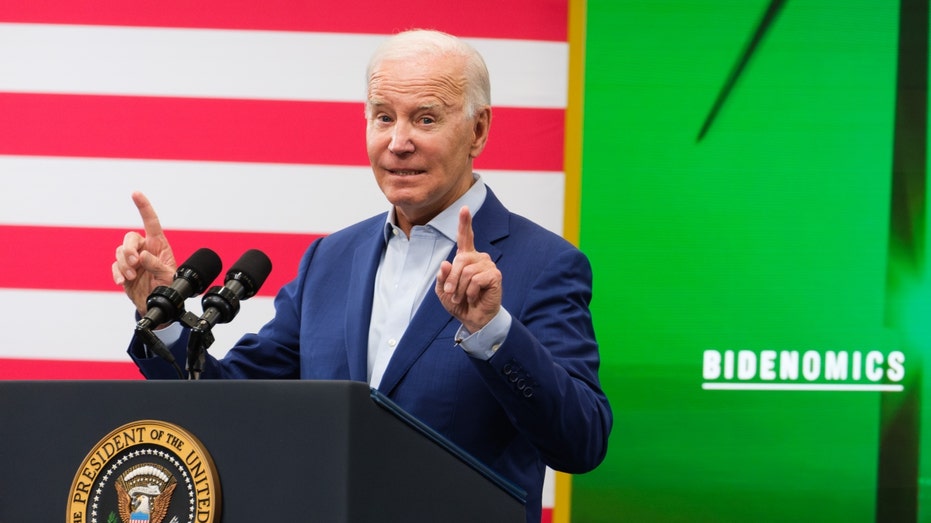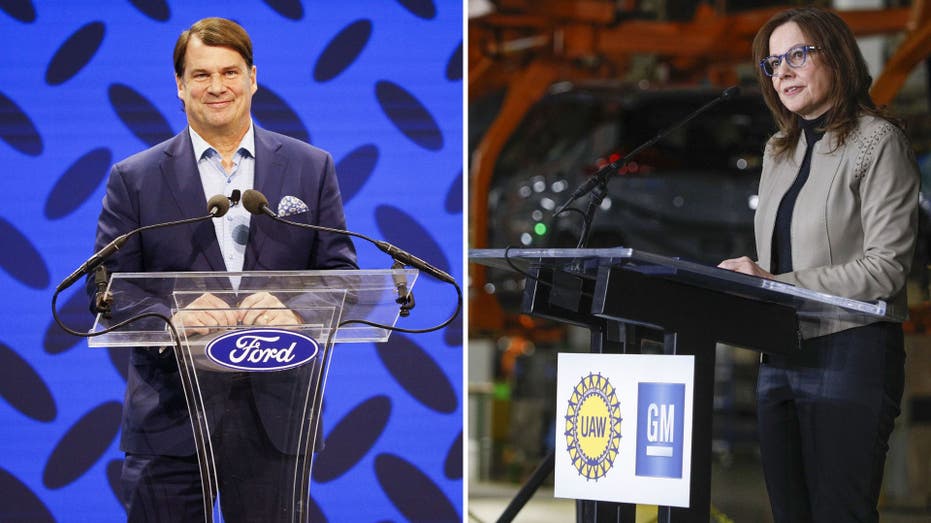Biden administration considering EV switch delay due to weak demand
The EPA is reportedly planning to delay a requirement that automakers rapidly expand EV sales until after 2030
Ford reducing electric truck production, a move that could impact more than 1,000 workers
FOX Business Jeff Flock reports from the Celebrity Ford of Toms River dealership, where electric F-150s arent driving off the lot fast enough.
The Biden administration is planning to give carmakers more time to ramp up sales of electric vehicles amid weak demand for EVs, according to a report by the New York Times.
The administration is planning to delay a requirement that auto companies quickly increase their sales of EVs in the next few years until after 2030, the Times reported citing people familiar with the White House's plan. The relaxed rule is part of a pending regulation that limits tailpipe emissions that will soon be finalized by the Environmental Protection Agency (EPA).
Under the EPA proposal submitted for review to the White House Office of Management and Budget, about 67% of new car sales — including sedans, crossovers, SUVs and light trucks — would be required to be electric by 2032, a dramatic increase from over 7% in 2023. It would also require up to 50% of buses and garbage trucks, 35% of short-haul freight tractors and 25% of long-haul freight tractor purchases to be electric by then.
The shift comes as President Joe Biden is facing competing political demands from environmentalist supporters who want to see the administration taking action on climate change, as well as unionized auto workers who are concerned that requiring the EV transition to happen before consumers want could cause automakers to cut jobs.
BIDEN ADMIN REPORTEDLY DOUBLING DOWN ON GAS CAR CRACKDOWN

President Biden's EPA is planning to delay a requirement that automakers rapidly expand EV sales until after 2030. (Ramsay de Give/Bloomberg via Getty Images / Getty Images)
EVs have taken a bite out of the profit margins at leading U.S. automakers Ford and GM, with consumers balking at the relatively high price for most EVs. According to the Alliance for Automotive Innovation, the average EV costs $52,500 after factoring in federal and state subsidies while the average subcompact car costs $24,000.
| Ticker | Security | Last | Change | Change % |
|---|---|---|---|---|
| F | FORD MOTOR CO. | 13.80 | +0.08 | +0.58% |
| GM | GENERAL MOTORS CO. | 84.24 | +0.94 | +1.13% |
Ford projected a loss of $5 billion to $5.5 billion on its EV division this year in its latest earnings report. The company launched a "skunk works" team separate from its main engineering unit that is focused on designing a small, low-cost EV that could compete with China-based BYD's Seagull model.
FORD’S PROFITS GETTING EATEN UP BY EVS

Ford CEO Jim Farley and GM CEO Mary Barra signaled an openness to collaborating with other automakers on EV technologies to make them more affordable. (Bill Pugliano/Getty Images / Getty Images)
"If you cannot compete fair and square with the Chinese around the world, then 20% to 30% of your revenue is at risk" over the next several years, Ford CEO Jim Farley said.
GM CEO Mary Barra said her company is well-positioned to begin breaking even on its North American EVs during the second half of this year if it can reach an annualized production rate of 200,000 to 300,000 vehicles and continue to benefit from federal EV subsidies under the Inflation Reduction Act.
GM missed its 2023 North American EV production targets in part because of problems manufacturing battery modules. Barra said GM is now on track to overcome those issues and fix software glitches that impacted the launch of the Chevrolet Blazer EV this year.
FORD, GM CEOS OPEN TO PARTNERSHIPS TO COMPETE WITH CHINA

China's BYD is competing with American-made EVs in Europe and may enter the U.S. market. (REUTERS/Kim Kyung-Hoon / Reuters Photos)
The CEOs of both Ford and GM signaled an openness to partnerships with other automakers on technologies that could make EVs more competitive with low-cost options from BYD and other Chinese automakers entering the European market and looking to start selling cars in the U.S. Their remarks came last week at a conference sponsored by Wolfe Research.
Farley said Ford is reevaluating its battery strategy as it looks to make its EV offerings more economical.
"We can start having a competitive battery situation. We can go to common cylindrical cells that could add a lot of leverage to our purchasing capability," Farley said. "Maybe we should do (this) with another OEM (automaker)."
GET FOX BUSINESS ON THE GO BY CLICKING HERE
Barra echoed that sentiment during the conference and said, "If there's ways we can partner with others, especially on technologies that are not consumer-facing, and be more efficient with R&D as well as capital, we're all in."
Fox News' Thomas Catenacci contributed to this report.




















